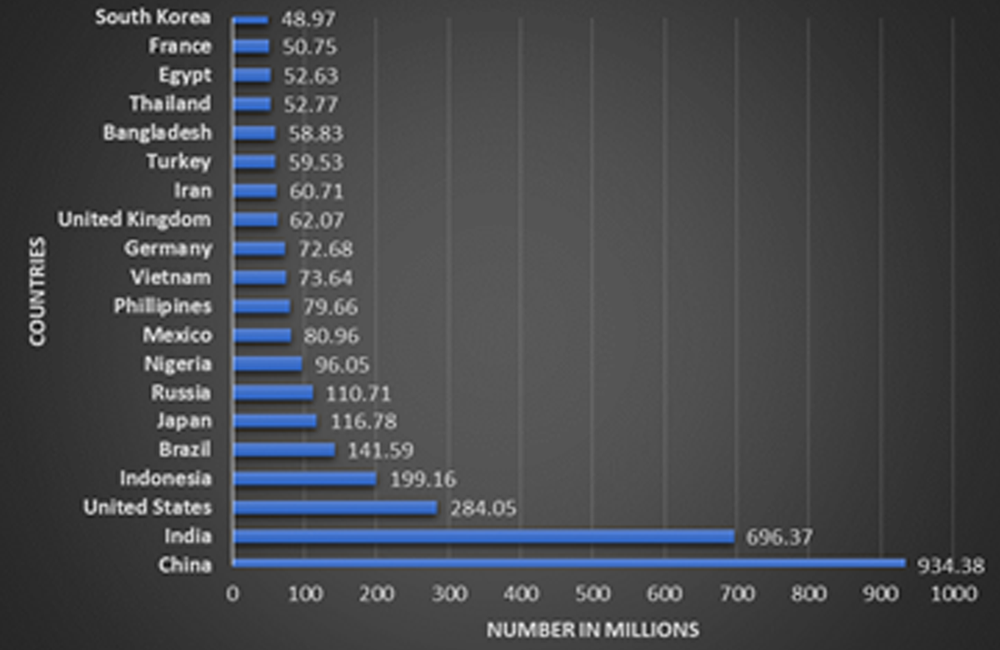
3 min read
Understanding Digital Marketing for Business Growth
The emergence of coronavirus has paused most of the business processes including, transport & logistics, supply chain, manufacturing, and marketing. However, many companies are gaining traction across the market by understanding the need for digital marketing solutions alongside dealing with problems to implement the same.
These businesses are pursuing such solutions as an overnight success. To which, declined engagement, sales outcomes, views & impressions, traffic, and pushed down search engine ranking is an add on.
It’s time for businesses to acknowledge this era where ‘online existence is the need of the hour’. An era, where techniques like search engine optimization (SEO) and social media marketing (SMM) require professional assistance to engage the user base as below.
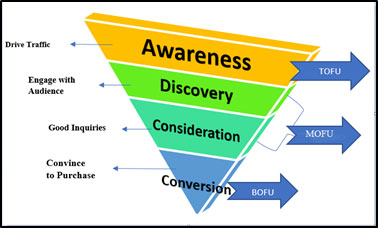
What is Digital Marketing?
It’s a type of marketing, driven by digital channels like social media, websites, search engines, email, etc. which can help:
- Promoting products, services, and solutions
- Reaching a wider audience and potential customers
- Targeting specific audience (domestic as well as international)
- Generating expected ROI
- Boosting visibility
Here’s what a digital buyer’s journey looks like (TOFU – top of the funnel, MOFU – middle of the funnel, and BOFU – bottom of the funnel).
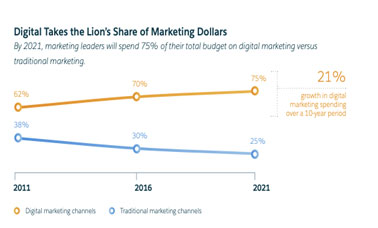
Digital Marketing vs. Traditional Marketing
While digital marketing uses online media like websites or in-app promotions, traditional marketing captures the user base with newspapers, magazines, etc. Let’s look at some of the significant differences with this image.
To thrive in 2020, it’s necessary to understand these differences and then curate marketing strategies accordingly. The key to a great marketing campaign in this time of crisis is an even mix of traditional and digital marketing solutions. Besides, businesses should not forget to acknowledge the current ‘Internet’ age by focusing on mobile-friendly digital channels backed by expert advice.
A closer look at the below graphical representation will give a better idea of how brand leaders are planning to move ahead in 2021.
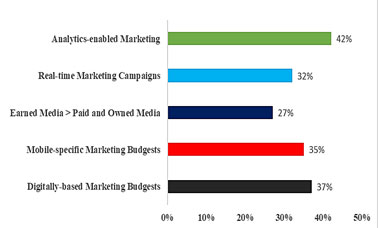
Why does your business need Digital Marketing?
“40% of the businesses attain decent capital saving while using digital marketing methods for their products and service,” says Gartner’s Digital Marketing Spend Report.
According to HubSpot, “Digital marketing channels achieve better cost-per-lead (CPL) results in comparison to other marketing channels”.
Google states, “Companies embracing the right digital marketing strategies have 2.8 times better growth expectancy”.
The businesses which do not lie under these categories using digital marketing solutions should think about redefining their marketing with the help of certified agents.
Recognizing the depicted, going digital will help in:
- Tracking every penny spent with precise ROI
- Faster revenue generation
- Delivering organic results
- Catering multiple devices in real-time
- Customer retention and new engagements
- Two-way communication
- Going local as well as global
A Low Down to Digital Marketing Strategies
Now, as we have walked through what is digital marketing, its significance, and why your business needs it, we can move towards understanding some strategies and how they work.
Website Marketing
A website highlights the first brand impression which can help in engaging well-paying customers. “An unattractive website layout can stop 38% of customer engagements,” says Adobe. Hence, a unique design and development strategy is necessary to attain optimized conversions and stand out. This calls for easy navigation, minimalistic layout, mobile-friendliness, and intuitive user experience.
Search Engine Optimization
Businesses that are unable to create a niche on search engines like Google lack the right SEO strategies as “71% of the buyer’s journey start on Google,” a Forrester research proclaims. An effective SEO strategy can help in website content optimization and gain organic traffic. Products and services can rank higher on search engine result pages (SERP) with emphasis on exact keyword density and Google’s expertise–authoritativeness–trustworthiness (E-A-T).
Content Marketing
Content marketing plays a key role in how digital marketing works to engage the targeted audience. Organizations can support their digital marketing campaigns with content marketing channels like blogs, videos, infographics, podcasts, ads, etc. The purposes can differ from awareness to lead generation alongside complying with the Google Core Algorithm Updates.
Social Media Marketing
SMM successfully drives the needed traffic to the website or a landing page. For instance, “Facebook has more than 2.7 billion monthly active users across the globe”. If businesses are not trying to engage these customers then the opportunities to acquire new leads would be lost. SMM on Instagram, Twitter, LinkedIn, and Pinterest also work well with assistance from professionals.
Pay-Per-Click (PPC) Advertising
Organic traffic is important but not recognizing the value of PPC advertising would miss out on conversions. Promoting brands with Google Ads multiplies the chances of ranking on the SERPs. While SEO strategies take time to let the brand earn profits, PPC ads help with much quicker visibility on the search engines. Companies can use this popular medium to attain quality leads. Take a look at the spent capital.
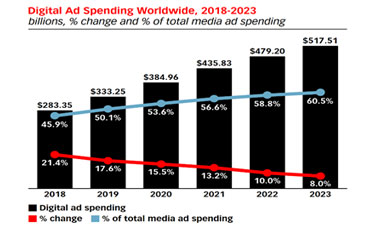
Wrapping Up
The preceding excerpt surely shed some light on digital marketing and how it can upsurge business growth in the longer run. It highlights the significance of integrated multi-channel marketing that collates all the strategies to create an intuitive customer experience
So, get professionals aboard and launch your digital campaign right now!